Fresh Greens Farms: The Business of Growing and the Growing of Business
Founded in 2019 by Karen Taylor, Fresh Greens Farm is a hydroponic urban farm that provides fresh, healthy, and tasty microgreens and herbs to the community in Memphis, Tennessee.
An avid gardener since childhood, Karen Taylor has always dreamed of growing things. In 2019, she made that dream a reality. Along with husband Charles, Karen owns and operates Fresh Greens Farm, an urban farm providing fresh, healthy, tasty microgreens to Memphis, Tennessee.
The business took a hit when COVID-19 forced local restaurants to close, costing the farm customers and a valuable source of revenue. Karen, however, won't be deterred. Despite setbacks, Fresh Greens Farm has stepped up its home delivery and subscription game while continuing to give back to the community.
Karen still loves growing, and today she's here to talk with us about growing greens, growing knowledge, growing a business, and growing relationships with the community.
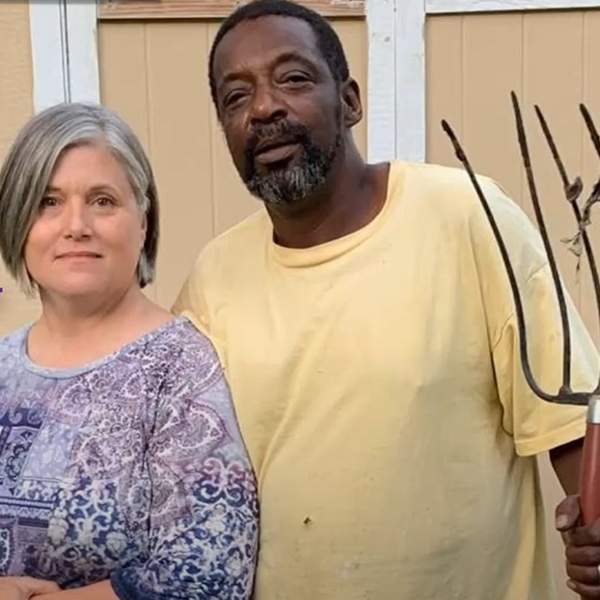
Tell us about your background. What skills helped you start Fresh Greens Farm? What new skills have you learned since it began?
I am a business analyst by day and run the urban farm nights and weekends. Business analysis helps me look at my business quantitatively — numbers don't lie. It's not the fun part of gardening, but it is important.
I knew how to grow hydroponically before I started Fresh Greens Farm, but growing microgreens in trays has a learning curve. I subscribed to an online course and learned what I needed to pursue my dream of being a farmer. We started selling in the spring of 2019 and are growing slowly but at a steady pace.
What inspired you to start Fresh Greens Farm? What motivates you to stay involved?
Before I started Fresh Greens Farm, I first considered selling hydroponic equipment. I love hydroponics, so I thought I wanted to sell to other enthusiasts. But when I sat down to write my business plan, I realized that what I really love is growing. The miracle of the seed inspires me.
I've been a gardener for over 10 years, but only started doing it for profit last year. I'd keep doing it, profit or not, but it is nice to have a business that pays for itself.
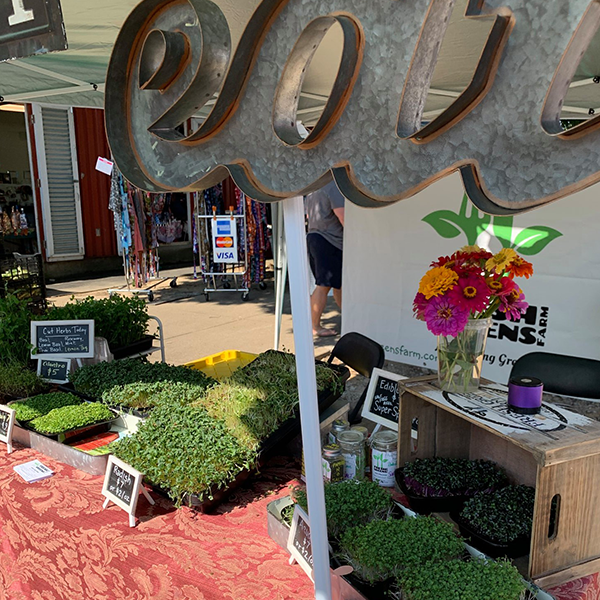
What makes Fresh Greens Farm unique?
Hydroponic urban farms are rare — that makes us kind of unique. We also grow niche produce. There are few companies here that sell microgreens. Most sell to commercial businesses and restaurants. While we have no problem doing that, we want to appeal to the home user.
So many people don't know what microgreens are or how good they taste. Growing microgreens, educating the public on growing food, and lots of sales make us happy.
Urban farming seems to be getting more popular. Why do you think that is?
Urban farms provide what mainstream stores can't — truly fresh produce. Buying local makes a huge difference in the quality and shelf life of produce. Flavors and textures fade when produce spends weeks at a time in transport or sitting on a shelf in a warehouse somewhere. It just tastes better when it's closer to the vine, or tray, in our case. You get the best produce at the perfect time, and it lasts.
What's your typical day look like?
Weekdays, I work 9-6 at my analyst job. After I get home, I take care of the dogs, and my husband, then go to our grow area and start working.
Daily cleaning and watering are required. I sow crops for the customers in the week ahead. Most microgreens need 6-16 days to grow.
Mondays are harvest days because all my deliveries are on Tuesday. Monday is also the day I do farm bookkeeping and customer emails. Based on the upcoming week's schedule, I know what I need to sow and when to harvest. Farm sanitization is Tuesday night. That's my winter schedule. When the spring farmers market opens up, I grow a lot more and add a second weekly harvest on Fridays.
What's something most people wouldn't know about urban farming?
It doesn't take acres and acres of land to grow food. Urban farming is all about making the most out of the limited space we all have in our homes and yards. It's lots of work, but the space in small yards and vertical space indoors is usually wasted. That space can help feed your family, make residual income, or even lead to a full-blown career.
My original dream was to show everyone that they can use the space they have to grow their own vegetables. Everyone! I still try to convey that when I talk to people.
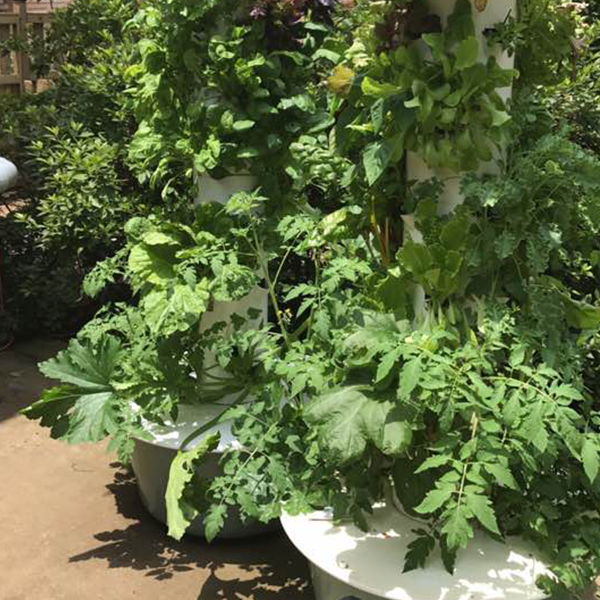
What has been Fresh Greens Farm's biggest challenge?
Startup expenses. We want to grow but don't yet have the funds to invest in the things we need to grow. We have one customer that could generate six figures for our farm! It's pretty exciting, but we'd need to invest in facility upgrades to meet USDA certification. We can't afford those right now, so we have to pass on that opportunity. I never thought I would have to say no to a big sale, but I can't accommodate the required procedures to ensure safety on that scale right now.
In the meantime, we are putting everything back into the farm and slowly adding customers. One day we will be able to afford the refrigerated trailer and large commercial refrigerator to store the quantity of microgreens they want to buy. I hope we can grow and attain USDA Harmonized Gap Audit certification in the next year.
What about your work makes you proud?
I think the accomplishment I am most proud of is starting the business in the first place. I am so proud of being a farmer. I love that title!
I love when someone eats our microgreens and says, "wow, that's so delicious! I had no idea produce could taste so good!" That's a real comment from a real customer. It makes me feel so good.
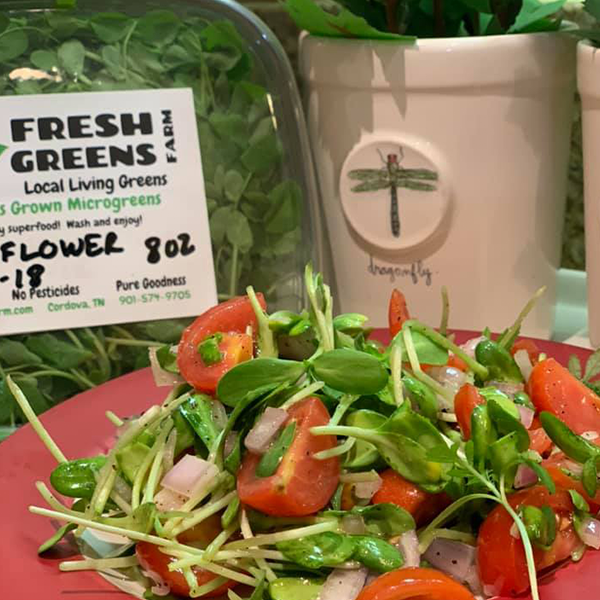
What part of this job do you personally find most satisfying?
The miracle of the seed. Take one little seed, add water, and boom — a miracle. Pounds and pounds of edible, nutritious vegetables. From a tiny seed! That miracle has never been lost on me since my first garden in grade school.
I also just love seeing people happy, and it makes me feel great when I can be a part of that. Whether it's selling delicious produce or giving to a great organization, doing this is very satisfying.
Tell us about how you give back to the community.
I want our work at the farm to benefit more than just us. God gave me the courage to start this business and an avenue to express creativity and my love of plants. I want to spread that blessing. God gives so we can share, so that's what I want to do. Produce, time, knowledge, or hard work.
Since we opened, we've been donating microgreens weekly to Caritas Village, a local community center that feeds the hungry and poor. It's more than just a soup kitchen — they have a kitchen and a café they use for charity and educational events. They also have a staff of local chefs volunteering, so they cook some amazing stuff.
Even before the pandemic, Caritas was teaching Memphis' future cooks in the kitchen, feeding the hungry, and providing great educational and cultural events for the Binghampton area. They are a true gift to Memphis.
I love walking in the door with a stack of microgreens for them. It feels so good to be part of that amazing organization. Reaching out to Caritas was my way of sharing the faith and planting a spiritual seed.
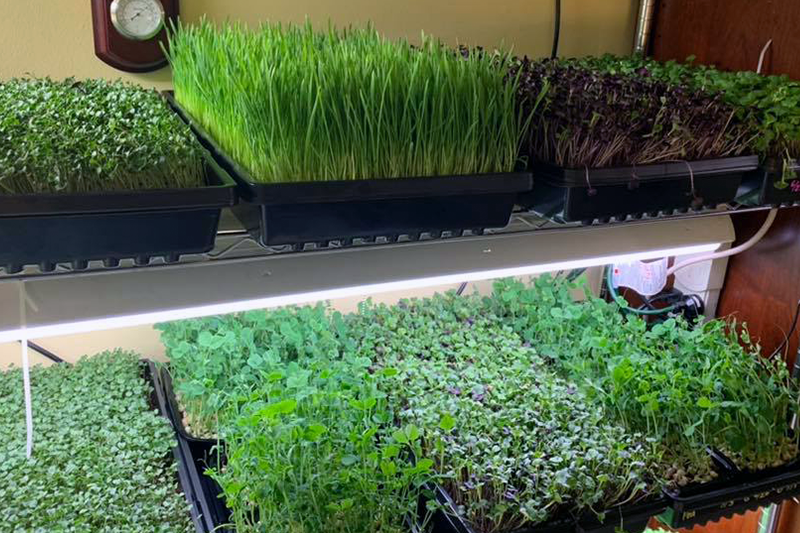
What advice would you give to someone trying to get into urban farming?
My advice is education! Look up your local agriculture extension office and use them. Build a relationship with them. My local agriculture extension office still helps me and reaches out to see how we're doing.
I took a class called "building a sustainable agricultural business" from them, and it was invaluable. It covered everything from business plans and financial workings to the many kinds of agricultural and animal husbandry farms. I learned so much, and I would recommend it.
What's the best advice you ever received about running a business?
First, allow yourself to feel the fear, then do it anyway. I first got a business license a decade ago but was too afraid to do anything with it. This time around, fear is still a reality, but I'm making it happen.
Second, it's all about the customers. If I can't keep them happy, my business will not last. Negative comments lead to negative reputation. Much of my business has been generated by satisfied customers' word of mouth. I want to be a primo microgreen producer with happy customers even if it eats into my profit a little.
Third, you must know your costs and expenses to know your profit. It's easy to spend on a business you love, but knowing the bottom line helps your spending decisions be wise ones. The answer to a spending question may not be "no," but just "not now."
Do you have a message to share?
If you dread what you are doing, choose something else. It took me years to realize that I love gardening. Had I not pursued hydroponic equipment sales, I wouldn't have been close enough to realize growing was my true love.
Don't be afraid to get it wrong. I was headed in the wrong direction, but I was headed somewhere, and it gave me a roadmap to figure out my true path.
Business is not meant to be an isolated thing. Small businesses and the community are connected. Like family, it's essential to reach out and let your business bless the community that puts food on your table.
There is a community of support, resources, customers, and professionals. There are people and organizations out there whose main purpose is to help. Seek them out and use them. There is no substitute for hard work and tenacity, but this community can help you build a strong framework for your business. --
Karen's not wrong about how reaching out can help your business thrive. If you need small business support, Swyft Filings' team of dedicated experts is ready to answer any question you have, and our learning center provides hundreds of articles filled with useful small business tips.
We want to thank Karen for taking the time to talk with us, for helping improve people's health, and for giving back to the community. If you live in the Memphis area and want some fresh microgreens delivered to your house, or if you'd just like to find some tasty green recipes, visit the Fresh Greens Farm website. Memphis residents can also follow them on Facebook to learn when they'll be at your local farmer's market.
https://youtu.be/XQ-FxIxqCpY
Swyft Blog
Everything you need to know about starting your business.
Each and every one of our customers is assigned a personal Business Specialist. You have their direct phone number and email. Have questions? Just call your personal Business Specialist. No need to wait in a pool of phone calls.




